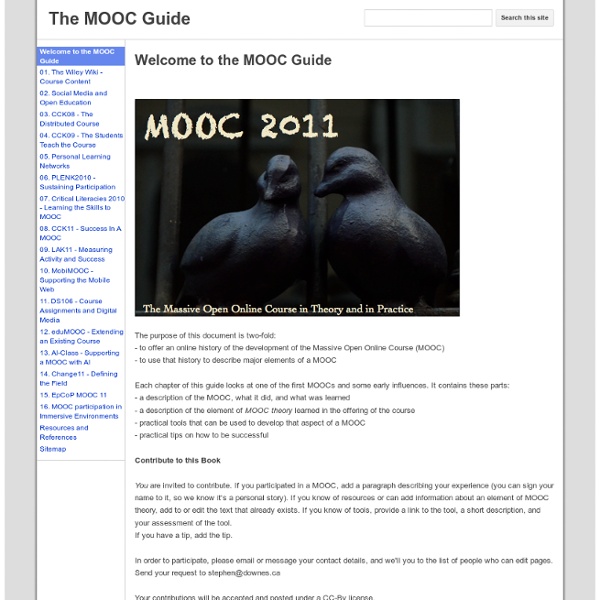



https://sites.google.com/site/themoocguide/home
The Technological Dimension of a Massive Open Online Course: The Case of the CCK08 Course Tools Antonio Fini University of Florence, Italy Abstract In 2008, a new term emerged in the already crowded e-learning landscape: MOOC, or massive open online course. Lifelong learners can now use various tools to build and manage their own learning networks, and MOOCs may provide opportunities to test such networks. This paper focuses on the technological aspects of one MOOC, the Connectivism and Connective Knowledge (CCK08) course, in order to investigate lifelong learners’ attitudes towards learning network technologies. The research framework is represented by three perspectives: (a) lifelong learning in relation to open education, with a focus on the effective use of learning tools; (b) the more recent personal knowledge management (PKM) skills approach; and (c) the usability of web-based learning tools.
Videos for #openbadges workshops [RESOURCES] A couple of months ago I wrote a popular post entitled How to make #openbadges work for you and your organisation. Given that I get requests every week to run workshops on Open Badges and can’t do them all, I thought I’d turn the points I made in that post into a couple of videos: (not showing? click here and here respectively) I’d very much appreciate some feedback. How can I improve these? David Wiley: Open Teaching Multiplies the Benefit but Not the Effort - Wired Campus A number of years ago, my wife and I were driving through a small town in southeastern Ohio when we saw a sign hanging outside a pizza shop that read, “Buy One, Get One.” We commented that if we paid for one, we’d by golly better get one. Such is the humor of academics. But jokes aside, I am increasingly amazed by the ease with which participatory technology allows university faculty members to go two-for-one in the reach and impact of their efforts in teaching. In 2004 I began asking my students to post their homework on their personal, publicly accessible blogs. (Students who didn’t have a blog before taking a class from me signed up for a blog as one of their first assignments.)
Massive open online course Poster, entitled "MOOC, every letter is negotiable", exploring the meaning of the words "Massive Open Online Course" A massive open online course (MOOC /muːk/) is an online course aimed at unlimited participation and open access via the web.[1] In addition to traditional course materials such as filmed lectures, readings, and problem sets, many MOOCs provide interactive user forums to support community interactions among students, professors, and teaching assistants (TAs). MOOCs are a recent and widely researched development in distance education which were first introduced in 2006 and emerged as a popular mode of learning in 2012.[2][3] Early MOOCs often emphasized open-access features, such as open licensing of content, structure and learning goals, to promote the reuse and remixing of resources.
Find Resources NGLC is working on a robust knowledge center to provide key information, practical and strategic guidance, research, and analysis to our site visitors. Stay tuned to see this center become a reality soon! These resources will identify what it takes for next generation learning to take root much more broadly than it is today, organized around six interdependent dimensions of goal-setting, methodology, and conditions necessary for growth:
The Movement Toward Movement: Emerging Trend Promotes Nonstop Creativity There’s a movement happening in classrooms around the country. Okay, that’s wildly overstating it. Let’s try it again. There’s a gradual push toward getting students up off their butts. Course: bonkopen2012: Instructional Ideas and Technology Tools for Online Success CourseSites by Blackboard Instructional Ideas and Technology Tools for Online Success Free, Open Course With Dr. Curt Bonk: The live course had ended, but please enjoy the course at your own pace! Description: Motivating students and creating community within blended and online learning environments are crucial to academic achievement and success. This open course will provide both theoretical concepts and practical tools for instructors to improve motivation, retention, and engagement within blended and online courses.
Program Goals Program Goals Today, too few students are ready for college. Next Generation Learning Challenges is a collaborative, multi-year initiative created to address the barriers to educational innovation and tap the potential of technology to dramatically improve college readiness and completion in the United States. The Current State Of Massive Open Online Courses (MOOCs) The Importance Of The Evolution Of Education 6.29K Views 0 Likes Over the past century, the modes of both imparting and receiving education have undergone a paradigm shift. The evolution of education has become more important than ever. This Is How Students Use School Websites 8.37K Views 0 Likes 64 Ed-Tech Lists for College Professors, Administrators and IT Professionals Technology is changing rapidly and, as a result, so is higher education. By leveraging the right technology in the right situations, professors can deepen student engagement and improve learning outcomes. That is the ultimate goal of technology in any education setting. Of course, all of this technology relies on a robust infrastructure to support connectivity and communication.
Week 01: Orientation You are not logged in. [] [] Welcome to Change MOOC! Welcome to Change - a Massive Open Online Course. This email is a short introduction to the course facilitators and to what you can expect next week. The course schedule is here: free to share this sign up link with colleagues: tag: #change11